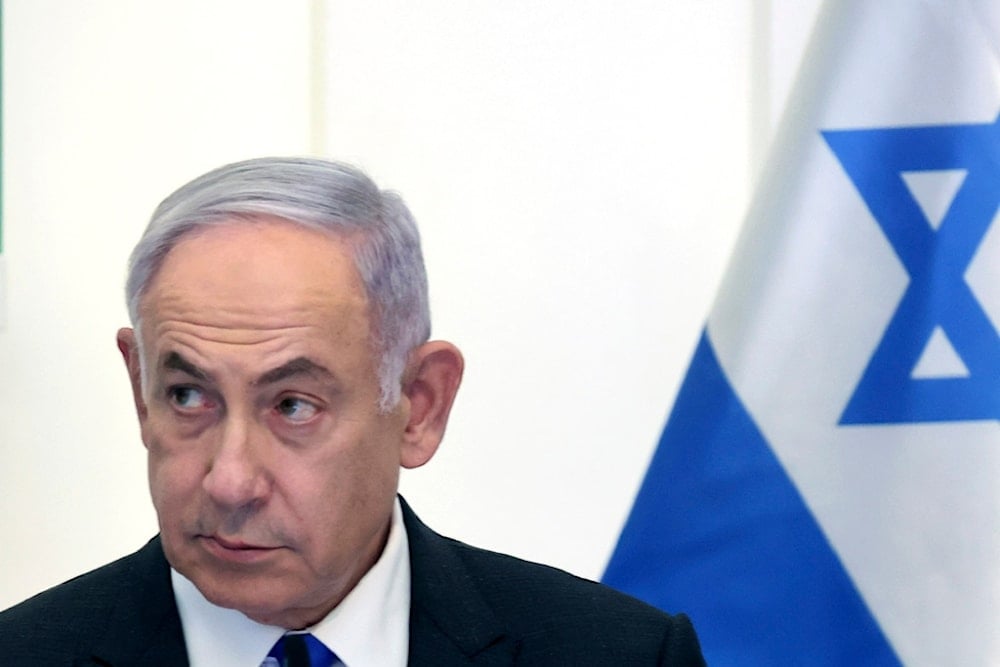Netanyahu throws temper tantrum at Gallant over ceasefire deal: Axios
Netanyahu insisted on keeping Israeli forces fully deployed along the Philadelphi corridor on the Egypt-Gaza border, a position opposed by both Hamas and Egypt.
-

Israeli Prime Minister Benjamin Netanyahu chairs a Cabinet meeting at the Bible Lands Museum in occupied al-Quds on Wednesday, June 5, 2024 (Pool Photo via AP)
Axios reported on Friday, citing Israeli sources, that a cabinet meeting on Thursday erupted into a heated confrontation between Israeli Prime Minister Benjamin Netanyahu and Security Minister Yoav Gallant.
According to the report, the discussions primarily focused on a proposed ceasefire deal in Gaza, which has been stalled for weeks after Netanyahu introduced new conditions to US President Joe Biden's July proposal for a ceasefire.
During the meeting, Gallant argued for moving forward with the deal, that it was not just about securing the release of captives but also a crucial strategic decision for "Israel."
Gallant said that a ceasefire could reduce regional tensions with Iran and Hezbollah, allowing the Israeli Occupation Forces (IOF) to regroup and shift focus to other threats.
Read more: 'Israel' had refused Hamas offer to release captives, bodies last year
Netanyahu, however, insisted on keeping the IOF fully deployed along the Philadelphi corridor on the Egypt-Gaza border, a position opposed by both Hamas and Egypt.
He presented maps showing the IOF's deployment and claimed that these plans had the endorsement of the Biden administration.
Gallant challenged Netanyahu, accusing him of misrepresenting the military's position, and argued that maintaining the current deployment could jeopardize the ceasefire deal and worsen regional tensions.
The argument escalated, with Netanyahu banging his hand on the table and accusing Gallant of lying.
Gallant retorted, suggesting that Netanyahu's approach could undermine negotiations and put the captives' lives at greater risk.
Despite Gallant's objections, Netanyahu and the majority of the cabinet voted to maintain full military control over the Philadelphi corridor.
Read more: Netanyahu insists on keeping forces in Philadelphi Corridor
Mediation efforts have shifted focus following the introduction of new conditions by Netanyahu to Biden's ceasefire proposal, some of which include the establishment of a permanent Israeli military presence in the Rafah area.
As a result, the focus of diplomatic talks has moved away from direct engagement with Hamas and towards broader discussions involving security arrangements along the Egyptian-Palestinian border in Gaza, particularly with Egypt over the Philadelphi Corridor.
Last Sunday, the Islamic Resistance in Lebanon - Hezbollah initiated its "initial retaliation" for the Israeli assassination of its senior military commander, Martyr Sayyed Fouad Shokor. Hezbollah attacked numerous Israeli military and vital targets, going as far as the Glilot base, located some 1.5 km from Tel Aviv.
On the following day, National Security Council spokesperson John Kirby called Hezbollah's recent drone and rocket attacks "sizeable," noting they were "different in scope than what we tend to see on a daily basis between Israel and Hezbollah."
Despite this, he assured that the attacks did not "not an impact on the talks in Cairo, and we're certainly glad to see that."

 3 Min Read
3 Min Read








